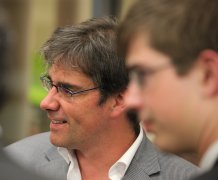
Professor Peter Cox
Exeter climate change expert wins prestigious national science award
One of the University of Exeter’s foremost experts in climate change research has been honoured with a prestigious national science award.
Professor Peter Cox, from the College of Engineering, Mathematics and Physical Sciences has been bestowed with a Royal Society Wolfson Research Merit Award.
He is one of just 21 scientists nationwide to be awarded the honour in 2014, in recognition of his outstanding research into Emergent constraints on Climate-Carbon Cycle Feedbacks.
Professor Cox, from Exeter’s Mathematics department, said he was “absolutely delighted” to receive the award, and paid tribute to the “exceptionally talented” people he has collaborated with during his career.
He said: “I feel highly honoured to be recognised by The Royal Society in this way.
“Awards of this type highlight the progress that we are now making in the understanding and prediction of climate-carbon cycle interactions, but there is much more to be done. These are exciting times.”
Professor Cox is an expert in climate system dynamics, and his current research interests include climate-carbon cycle feedbacks, geoengineering, climate tipping points and the impact of atmospheric pollutants on ecosystem services.
Together with fellow Exeter Mathematics professor, Pierre Friedlingstein, he has recently conducted research that shows a key uncertainty in projections of future climate change – namely the sensitivity of the tropical carbon cycle – can be hugely reduced by looking at how the concentration of carbon dioxide in the air varies from year-to-year.
Previously, Professor Cox has held posts as Science Director - Climate Change at the Centre for Ecology and Hydrology, and as Head of Climate Chemistry and Ecosystems at the Met Office-Hadley Centre.
The Royal Society Wolfson Research Merit Award is jointly funded by the Wolfson Foundation and the Department for Business, Innovation and Skills (BIS).
It aims to provide universities with additional support to enable them to attract science talent from overseas and retain respected UK scientists of outstanding achievement and potential.
The newly appointed award holders are working on a wide range of projects including looking at the way users interact with mobile technology in developing regions, and using a pre-clinical model to help advance neuroprotective therapies for infants that experience perinatal asphyxia.
The Wolfson Foundation is a grant-making charity established in 1955. Funding is given to support excellence. More information is available from its website.
Date: 31 January 2014
